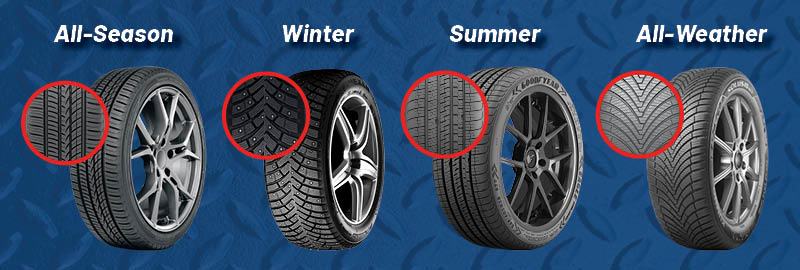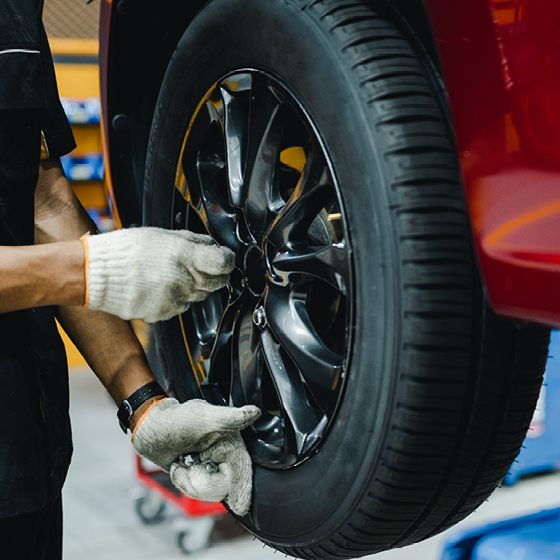Choosing the best tires for different seasons involves understanding the specific needs and challenges posed by varying weather conditions. In this guide, we will explore the different types of tires, their unique features, and when they are most suitable, helping you make an informed decision.
Overview: Choosing the Right Tires
There are different types of tires, each designed for specific driving needs and weather conditions. Factors such as thread pattern, rubber compound, and tire size all influence how a tire performs in different conditions.

Understanding Different Types of Tires
-
All–Season Tires:
Designed for year-round use, these tires offer a balance of traction, handling, and durability in various weather conditions. They typically have moderate tread depths and rubber compounds that work well in both warm and cold temperatures.
-
Winter Tires:
Specially designed for snowy and icy conditions, winter tires provide both improved traction and control in the cold weather. They have deeper tread patterns with sipes (tiny slits) that enhance grip on slippery surfaces. They also use special weather compounds that remain flexible in cold temperatures. In regions where snow tires are mandatory, tires with the Three-Peak Mountain Snowflake symbol are the standard mark for complaint tires.
-
Summer Tires:
Optimized for warm weather, summer tires offer improved handling and performance in dry and wet conditions. They have different tread patterns and use rubber compounds that are designed to perform best in higher temperatures.
-
All–Weather Tires:
Designed to provide a balance of traction, handling, and durability in various weather conditions, including dry roads, rain, snow, and ice. They have deeper tread depths and unique thread patterns with softer compounds for better grip in cold temperatures.
Choosing the Right Tires for Each Season
With the many tire options available, choosing the right one can be challenging. Here is a detailed breakdown of the three main types along with maintenance tips for ensuring optimal performance and extending the life of your tires.
All–Season Tires:
All-season tires are popular among drivers seeking year-round convenience without the hassle of seasonal tire changes. It is important to keep their pros and cons in mind when compared to specialized summer or winter tires.
Pros:
- Versatility: Are designed to perform well in various weather conditions.
- Convenience: They eliminate the need to change tires with the seasons.
- Comfortable ride: They are designed to provide a comfortable ride and reduce noise levels, making them a great option for those who prioritize comfort.
- Long tread life: They are designed to last longer than winter tires or summer tires.
- Good traction: All-season tires provide good traction on dry and wet roads, making them a safe option for everyday driving.
Cons:
- Compromise on performance: All-season tires are designed to be between a winter and summer tire, which means they may not perform as well as specialized tires in extreme weather conditions. They may not provide the best traction in deep snow or icy conditions or not the best option for drivers who live in areas with harsh weather conditions.
- Fuel efficiency: They may not be as fuel-efficient as summer tires, which can impact gas mileage.
- Durability: All-season tires may not be as durable as winter tires, which can impact their lifespan.
Best Use Case:
All-season tires are a great option for drivers who live in moderate climates with minimal extreme weathers, drive in a variety of weather conditions, and want a tire that can handle everyday driving needs.
Maintenance Tips:
Regularly check tire pressure, proper tire balancing to ensure even wear and prolog tire life, rotate tires every 5,000 to 8,000 miles.
Winter Tires
Winter tires are essential for driving in severe winter conditions, providing superior traction on snow, ice, and slush. They have deeper thread for longer tire life and unique tread patter for improved traction. Specialized rubber compounds for optimal grip.
They are specifically engineered to handle challenges of low temperatures and slippery surfaces, offering safety and peace of mind during winter driving conditions.
Maintenace Tips: Regularly check tire pressure, especially in cold weather, and monitor tread depth to maintain optimal winter driving performance.
Summer Tires
Summer tires excel in warm weather conditions, providing enhanced grip and handling on both dry and wet roads. They have shallower tread depths and advanced rubber compounds designed for high-performance driving in hotter temperatures.
It is a great option for drivers who live in warm climates with minimal winter weather, drive high performance vehicles and want maximum handling and control in warm weather.
Performance Benefits: Improved cornering stability, shorter braking distances, and enhanced responsiveness in summer conditions for safer and enhanced driving experience.
Maintenace Tips: Regularly inspect for wear and damage, maintain correct tire pressure for performance and fuel efficiency. Monitor tread depth, align, and balance them to enhance stability and longevity.
All-weather Tires
They are a great option for drivers who want a single set of tires that can handle different weather conditions without compromising performance. The unique thread patterns and compound adapt to changing temperatures and road conditions. They also have reinforced sidewalls for improved durability.
Pros:
- Convenience and Versatility: No need to change tires seasonally as it handles various weather conditions.
- Improved traction: Better grip and handling in various weather conditions.
- Reduced Noise: Softer compounds and thread patterns reduce road noise.
- Cost-Effective: No need to purchase separate tires depending on the season.
Cons:
- Reduced thread life in Warm Weather: Softer Compounds can lead to reduced thread life in warmer weather.
- Not Suitable for Extreme Weather: May not be suitable for heavy snowfall, high-performance driving, or extreme temperatures.
- Limited Availability: Fewer options available compared to all-season or dedicated summer/winter tires.
Best Use Case: Drivers who live in areas with moderate weather conditions, who prioritize convenience over extreme performance.
Maintenance Tips: Avoid exposing the vehicle to extreme temperatures and clean the tires regularly to prevent brake dust and grim buildup. Check tire pressure regularly, tire rotations and keep an eye on thread depth.
While it is important to consider the vehicle type, climate and driving habits in choosing the right tire, at Tire Choice, we are happy to help you with not just guiding the right tire for your vehicle but with all your tire needs.
FAQs About Seasonal Tires:
- When should I replace my tires?
Replace tires when tread depth reaches 2/32 inch to maintain safe driving conditions. But in wet or snowy weather where adequate tread depth is needed for traction replacing them when it reaches 4/32 is recommended. Visit your local Tire Choice store for proper diagnosis and recommendations.
2. What is tire balancing, and why is it important?
Tire balancing involves adjusting weights on the wheel to ensure even weight distribution, reducing vibrations, and improving ride quality for a smoother driving experience.
3. Do I need winter tires if I have all-season tires?
While all-season tires offer versatility, dedicated winter tires provide superior traction and safety in severe winter conditions, including ice and deep snow.
4. How long do winter tires last?
Winter tires typically last for 3 to 5 winter seasons, depending on a range of factors such as driving habits, road conditions, and maintenance. Monitoring tread depth is crucial and replacing them when it reaches 6/32 inch ensures continued safety and performance in icy and snowy conditions.
5. Can I use summer tires year-round?
Using summer tires in winter is not recommended due to reduced traction and potential safety risks in cold weather and snow conditions.
6. What is the difference between All-Season and All-Weather tires?
All-Season tires are designed to offer balanced performance in a variety of conditions but are optimized for milder climates. All-Weather tires are designed to handle a broader range of weather conditions, including moderate snow and ice.
Choosing the right tire for different seasons is fundamental to ensuring safety, performance and driving comfort throughout the year. Each type offers distinct advantages tailored to meet seasonal challenges. By following proper maintenance practices and consulting with our expert Technicians at Tire Choice Auto Service Centers you can ensure your tires are always in top condition. You can also take advantage of our free multi-point inspection called ConfiDrive® Performance Review to not just inspect your tires but check up on your car’s overall health. Remember, regular inspections, tire rotations, and seasonal changes are key to maximizing tire lifespan, help prevent uneven wear, improve fuel efficiency, and reduce the risk of tire failure.
Visit our page to know more about tires and other services we offer.



